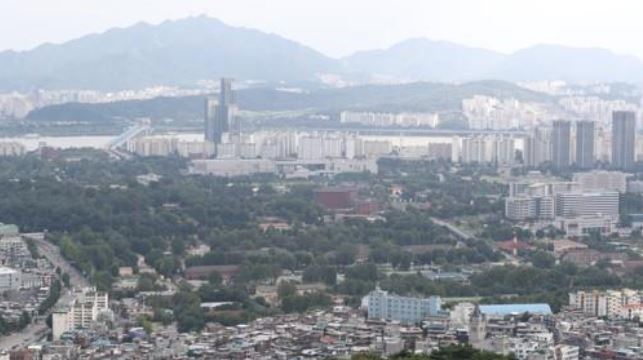US returns 12 military sites to S. Korea, including some at Yongsan Garrison
By YonhapPublished : Dec. 11, 2020 - 14:16

The United States on Friday returned 12 American military sites to South Korea, including some in central Seoul, amid persistent concerns that an additional delay would further dampen regional development efforts.
During a virtual joint committee session of the Status of Forces Agreement (SOFA), Seoul and Washington agreed on the return of the sites, though they failed to bridge differences on who and how to shoulder environmental cleanup costs, Seoul officials said.
But the two sides agreed to continue consultations on procedures for joint contamination surveys, contamination management criteria and other outstanding issues going forward, they said.
Among the returned sites are two plots inside the Yongsan Garrison in central Seoul, Camp Kim and four other sites used by the US Forces Korea (USFK) in the capital city.
It is the first time that sites at the Yongsan complex -- the erstwhile US military headquarters -- have been handed over to South Korean control. Seoul plans to establish a national park there.
The other returned sites are the Camp Walker heliport in the southeastern city of Daegu; Camp Jackson and Camp Mobile in the northern cities of Uijeongbu and Dongducheon, respectively; Sungnam Golf Course in Hanam, south of Seoul; Commander Naval Forces Korea (CNFK) Detachment in the southern port city of Pohang; and Pilsung Air Range in the eastern city of Taebaek.
Combined, they are around 1.45 million square meters.
Seoul and Washington agreed on the return on the condition that they continue consultations on responsibilities for base decontaminations, ways to strengthen the environmental management of installations currently under USFK control and the revision of SOFA-related documents, according to the government.
SOFA governs the legal status of 28,500 American troops here.
"Discussions are under way on the potential return of the remaining 12 US military sites in South Korea," Choi Chang-won, first vice minister of government policy coordination, said.
Talks about the return date back to the early 2000s, but South Korea and the US have made little progress amid disagreements over decontamination procedures, base realignment considerations and other complicated issues.
The current Moon Jae-in administration has been pushing for their swift return amid residents' worries that a further delay could complicate decontamination efforts for already vacated bases and hinder regional development prospects.
"The Joint Committee took note of the extensive consultations regarding the conditions of returning camps and reaching a mutually acceptable solution for remediating contamination on those camps," according to the joint statement by the SOFA committee.
"The parties agree that further delays aggravate the economic and social challenges of the local communities surrounding the camps and that the returns process should be expedited," it said.
The government is reviewing building public homes at the Camp Kim site and relocating the National Medical Center in Seoul to the vacated site of the US Army Corp of Engineers, according to the officials.
Some of the sites could be either sold off or kept as part of government assets, they added.
Ahead of pushing for those projects, decontamination work needs to be conducted, which is to take around two to three years. The level of oil and heavy metal pollutants in 11 of the 12 returned sites exceeded the threshold set by domestic law, according to the defense ministry.
South Korea plans to pay the decontamination cost first and discuss the matter with the US later.
How much it will cost is not known, but the ministry said it spent around 98 billion won ($89.94 million) to clean up three US military sites returned by the US last year.
The US has insisted that it should shoulder the burden only when contamination poses imminent and substantial risks to public health and natural environments.
"South Korea and the US have revealed differences in what the SOFA phrase 'known, imminent and substantial endangerment to human health' means," a defense ministry official said.
"We've maintained our stance that the US should shoulder part of the cleanup expenses in accordance with the Memorandum of Special Understandings on Environmental Protection, which is one of the SOFA-related documents. We will continue to discuss the matter," he added.
Some say Seoul needs to use its shouldering of the decontamination expenses as leverage in defense cost-sharing negotiations, but the defense ministry made clear that the base return has nothing to do with the SMA deal.
Seoul and Washington remain deadlocked over their defense cost-sharing agreement, named the Special Measures Agreement (SMA).
The US demanded a hefty increase in Seoul's financial burden, while South Korea says its best offer stands at a 13 percent increase. (Yonhap)







![[KH Explains] How should Korea adjust its trade defenses against Chinese EVs?](http://res.heraldm.com/phpwas/restmb_idxmake.php?idx=644&simg=/content/image/2024/04/15/20240415050562_0.jpg&u=20240415144419)











![[Today’s K-pop] Stray Kids to return soon: report](http://res.heraldm.com/phpwas/restmb_idxmake.php?idx=642&simg=/content/image/2024/04/16/20240416050713_0.jpg&u=)